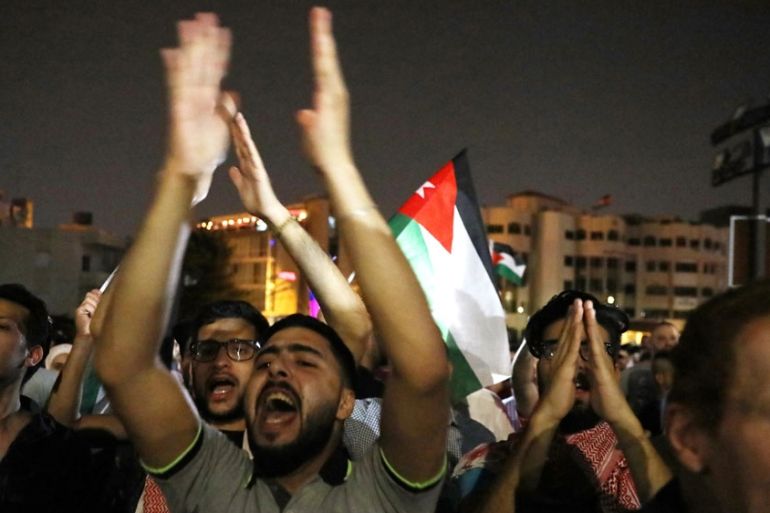Jordan crisis: Why Gulf states are rushing to step in
Fearing a second Arab Spring at their doorstep, Saudi Arabia and other Gulf States are eager to help Jordan’s economy.

Saudi Arabia will host a regional summit to discuss the ongoing economic crisis in Jordan, where a proposed income tax law recently prompted some of the largest protests in years.
The meeting in Mecca on Sunday will be attended by Saudi King Salman, Jordan’s King Abdullah II, Kuwait’s Emir Sheikh Sabah Al Ahmad Al Sabah and the Crown Prince of Abu Dhabi Sheikh Mohammed bin Zayed Al Nahyan.
Keep reading
list of 4 itemsBoeing hit with 32 whistleblower claims, as dead worker’s case reviewed
US imposes new sanctions on Iran after attack on Israel
A flash flood and a quiet sale highlight India’s Sikkim’s hydro problems
King Abdullah II hopes the summit will provide Jordan with an immediate cash infusion to help it offset the current budget deficit, which amounts to about $700m, sources in Jordan’s royal court told to Al Jazeera on condition of anonymity.
The king will also push his Gulf allies to renew their previous financial grant agreement, which injected $1.25bn a year into Jordan’s coffers from 2011 until 2017.
Fearing the spread of popular revolt to other Arab monarchies during the so-called Arab Spring in 2011, the Gulf Cooperation Council (GCC) made a strategic decision to help the Jordanian and Moroccan monarchies with a five-year agreement worth over $5bn each.
The passing danger of the Arab Spring and the ascendance of Mohammed bin Salman to the top of the leadership in Saudi Arabia, resulted in Jordan feeling marginalised or even neglected by Saudi Arabia, which traditionally backs Jordan.
Fear of a second Arab Spring
However, with the end of the Arab Spring and shifting alliances in the region, the three GCC countries opted not to renew the aid agreement, resulting in increasing Jordan’s economic instability.
Protests erupted in Jordan’s capital Amman and other provinces earlier in the month, where large crowds demanded the resignation of the government and the scrapping of the tax law.
Prime Minister Hani al-Mulki stepped down last week, in what was lauded as only the third time in Jordan’s political history that popular protest succeeds in bringing down the government.
Earlier governments were toppled in 1955 and 1989 over political and financial crises.
“The passing danger of the Arab Spring and the ascendance of [Crown Prince] Mohammed bin Salman to the top of the leadership in Saudi Arabia resulted in Jordan feeling marginalised or even neglected by Saudi Arabia, which traditionally backs Jordan,” a senior Jordanian official, who works closely with the European Union in Jordan, told Al Jazeera.
The official, who declined to be identified for this report because he was not authorised to speak to the media, said the recent protests were almost a godsend to the government; the protests heightened fear in the Gulf, which Amman used to its advantage in prompting the Gulf states to come to its aid.
“And it worked,” the official said.
For one, the public will feel empowered and proud that it toppled a government over unpopular economic decisions. Two: It will also serve as a precedent for future governments, making them more accountable and sensitive to street demands.
Lasting impact
“The Gulf states, mainly Saudi Arabia, are very sensitive to any demand for reform in Jordan because they fear it will affect them and set a bad example for the own population,” the official added.
Adnan Abu Odeh, a former chief of the royal court under the late King Hussein, told Al Jazeera that the meeting in Mecca will practically “save Jordan”.
“Had the demonstrations continued, the survival of the regime might be in question,” said Abu Odeh, who also served as an adviser to King Abdullah II.
Abu Odeh also thinks the success of the protesters in bringing down the government will have a lasting effect on the way Jordanian governments will behave in the future.
“The public will feel empowered and proud that it toppled a government over unpopular economic decisions,” Abu Odeh argued, adding: “It will also serve as a precedent for future governments, making it more accountable and sensitive to street demands.”
From a security perspective, however, Abu Odeh, who was an intelligence officer before entering politics, said the recent events are setting a “dangerous precedent” and “loosened the intelligence and the regime’s grip on power it now holds”.
“The Saudi leadership view these developments as a serious threat that might be contagious,” he said.
Speaking to Al Jazeera from Amman, Khalil Atieh, a member of Jordan’s parliament, said, “it is not in the interests of Arab states to see instability and chaos in Jordan”.
Jordan’s debt amounts to about $40bn and the government is required to pay more than $1.2bn in interests every year, a chokehold that economic analyst Mazen Irsheid blamed on successive Jordanian governments.
Irsheid said Jordan’s biggest economic problem is its historic dependence on foreign aid, which often negated the need for economic reform and bred corruption.
|
|
“We should blame ourselves and our economic policies that failed to limit budget expenditures while increased spending,” he added.
Irsheid worries that once the Gulf states start pouring cash directly into Jordan’s budget, it will create a false sense of economic security and slow down reform.
Follow Ali Younes on Twitter @ali_reports